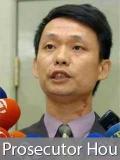The defector and the responsability of the media and politicians
FOB has addressed the topic of apostates several times, including the study "Apostates and New Religious Movements" by Bryan Ronald Wilson, Emeritus Fellow, University of Oxford, and the article "The Defector's Syndrome" by attorney Fabrizio d'Agostini, founding member of FOB. The following article, by Willy Fautré, director of Human Rights Without Frontiers, exemplifies a typical modus operandi in the anti-cult world ...


















